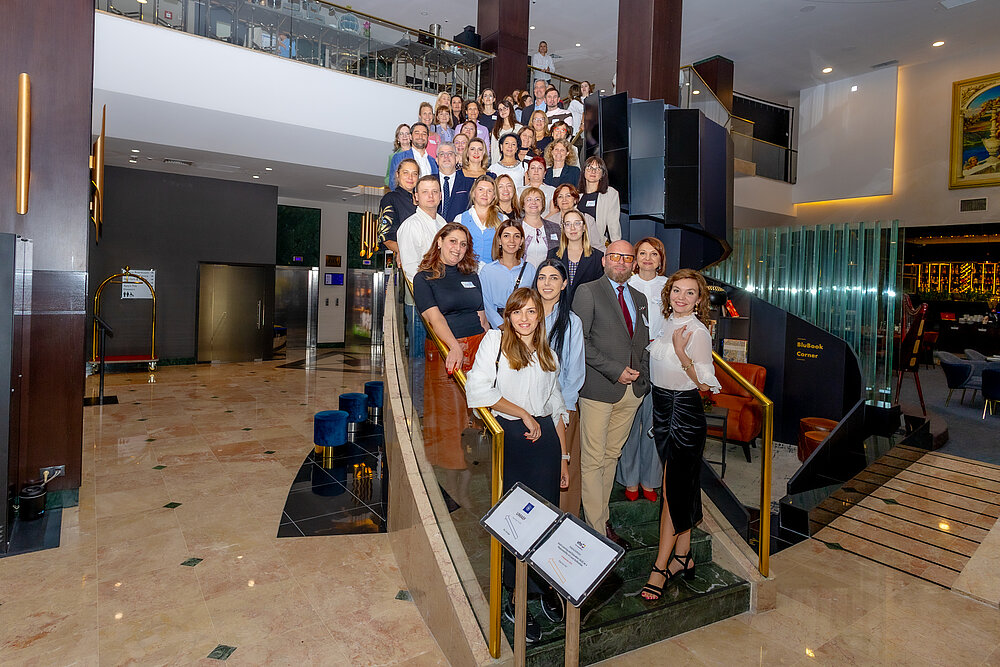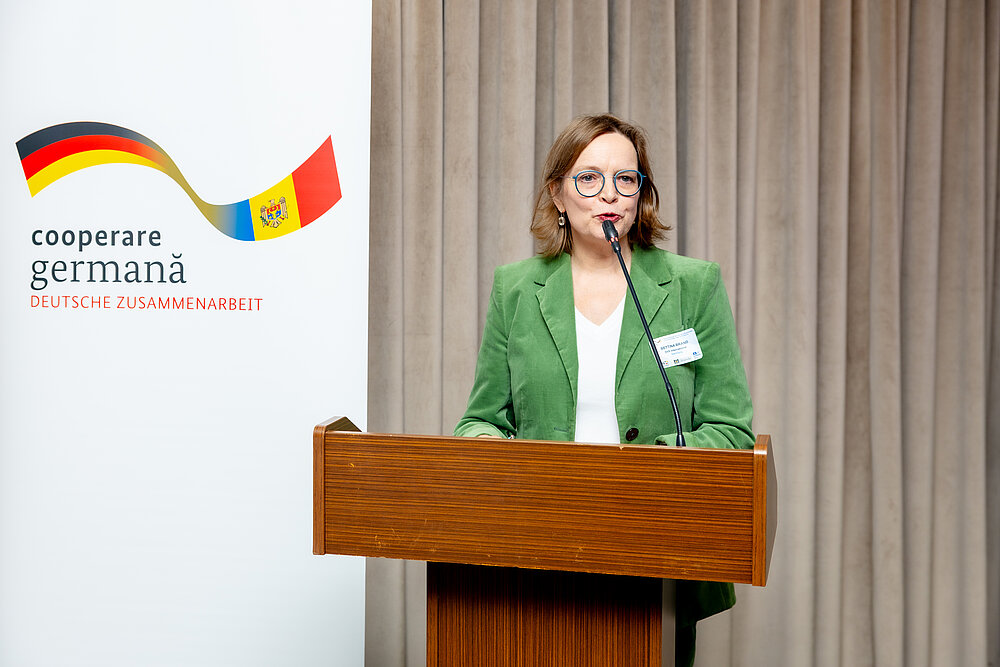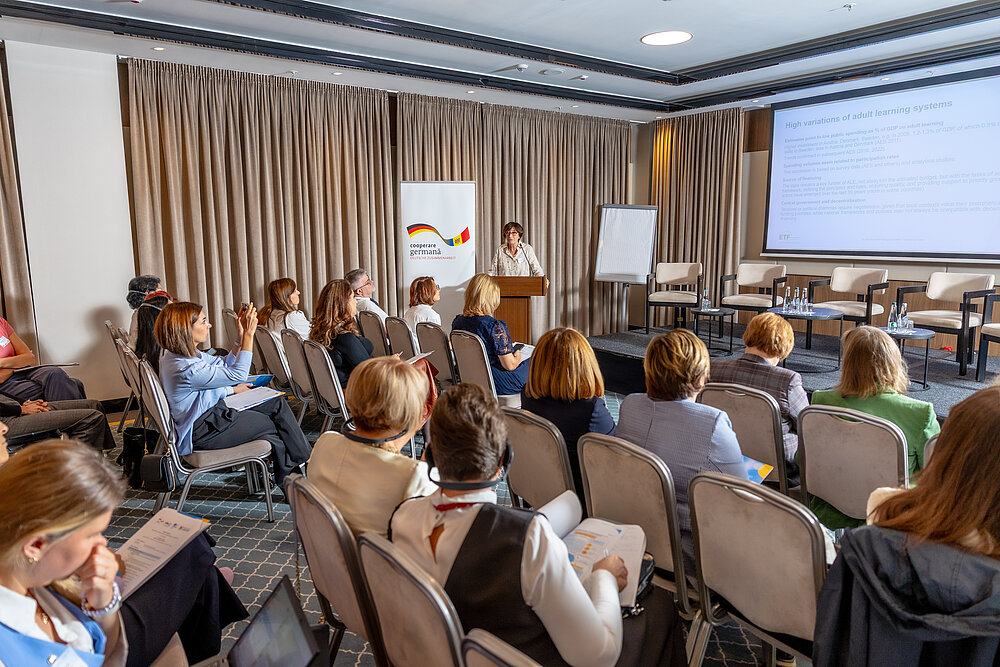The Regional Conference “Adult Learning and Education (ALE) as a Responsibility of Local Authorities” took place in Chișinău, Republic of Moldova, on 16–17 September 2025. It was organised by DVV International in cooperation with the UNESCO Institute for Lifelong Learning (UIL) and Chișinău City Hall.
The conference brought together 58 participants from Armenia, Bosnia and Herzegovina, Georgia, Moldova and Ukraine, as well as international experts from Germany, Austria and European networks. Representatives of local authorities, non-formal education providers, academia and international organisations delivered presentations on their experiences and actively participated in discussions.
Cities and municipalities play a crucial role in ensuring access to lifelong learning by developing appropriate strategies, establishing community learning structures, and allocating financial resources. The concept of Learning Cities, promoted by the UIL, illustrates how municipal authorities can create sustainable frameworks for community development and local prosperity through education. Therefore, the event aimed to provide a platform for participants to share their experiences and best practices and reflect on the role of local authorities in promoting adult learning, drawing on German, European and international approaches.
The opening speeches were moderated by Aliona Badiur (Head of the Continental Exchange Project, DVV International) and delivered by Dr. Daniela Munca-Aftenev (Deputy Head of the General Directorate for Education, Youth and Sport (DGETS), Chisinau City Hall), Katja Römer (UNESCO Institute for Lifelong Learning (UIL), Hamburg, Germany) and Levan Kvatchadze (Regional Director, DVV International). During the starting session, each speaker delivered welcoming words, opening remarks, and highlighted the importance of collaboration and shared goals in ALE promotion.
The first day of the conference featured plenary sessions with contributions from international experts, as well as presentations of city-level experiences. Representatives of the UIL, the European Training Foundation (ETF) and the Organisation for Economic Co-operation and Development (OECD) made contributions, addressing topics such as financing (ALE), the autonomy of municipalities and international recommendations for inclusive learning policies.
Case studies from the UNESCO Global Network of Learning Cities were presented by representatives of Lviv (Ukraine), Chișinău (Moldova) and Dresden (Germany). These studies highlighted different approaches to promoting inclusive and sustainable learning at city level. Further examples of good practice were provided by adult education centres in Nuremberg and Frankfurt, Germany.
In the last interactive group session, representatives of different countries took part in a sharing of challenges and good practices they face in their daily work. The following points were mentioned as challenges for ALE development at national level:
Changing political contexts put pressure on civil society’s activity.
An incoherent legal framework with no real executive power and no clear role distribution within the ALE domain.
ALE activities are either commercial or project-based and lack real sustainability, particularly in financial terms.
ALE has no legal framework in some countries and is not prioritised at the decision-making level.
Budget cuts and a lack of workforce due to the military conflict in Ukraine.
At the same time these good practices were highlighted:
Social enterprises are a sustainable form of financing ALE.
Approaching the private sector as both an ALE provider and a partner in policy dialogue.
Creating a working group with government representatives to collaborate on legal frameworks and ALE strategies.
Providing micro-credential courses to engage more people, especially those with work overload, family responsibilities, or in vulnerable communities. Cooperating with private companies to provide courses for their employees – direct market collaboration.
The day concluded a reception to mark the 15th anniversary of DVV International’s activities in the Republic of Moldova.
On the second day, the participants were welcomed by Chișinău City Hall, which has been a member of the UNESCO Global Network of Learning Cities since 2020. The programme included a visit to the Municipal Centre for Adult Education and Training (CMIEA), where participants learnt about the city’s approach to lifelong learning and explored the centre’s facilities and activities.
Afterwards, participants from Ukraine took part in a workshop led by Alona Popova, representing UNESCO Antenna in Ukraine. The main topics discussed were the development of ALE strategies for Ukrainian Learning Cities, the next steps for cities wishing to join the network, and the coordination points with UNESCO and DVV International as facilitating institutes.
The conference reaffirmed that local authorities are indispensable in promoting and implementing ALE. By adopting coherent strategies, ensuring adequate financing and building strong partnerships, municipalities can contribute significantly to developing resilient communities and inclusive societies by adopting and promoting ALE at micro and macro levels.
The exchange of experiences and good practices during the conference is expected to further strengthen regional cooperation and support the integration of ALE into local development agendas across the participating countries.
The Regional Conference was financially supported by the German Federal Ministry for Economic Cooperation and Development (BMZ).






